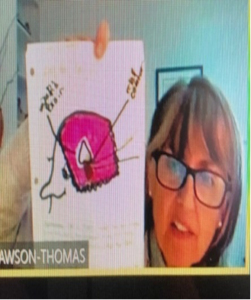BrainWise Is a Game Changer
Posted On: April 21, 2021BrainWise instructors know their students, families, and clients can answer the question, “What were you thinking?” They have taught BrainWise to people of all ages, educational backgrounds, cultures, and developmental abilities and are confident their graduates understand the roles neural pathways and the five senses, limbic system, amygdala, hypothalamus, thalamus, and prefrontal cortex play in critical thinking.
This is possible because BrainWise replaces the preceding technical terms, which are seldom heard outside the scientific milieu, with highly schematic words: Wizard Brain, Lizard Brain, brain connections, relay center and thinking skills. Using BrainWise tools and language to explain complex brain functions helps instructors – even high school student instructors — effectively describe these ideas to others so they learn how to Stop and Think. The BrainWise Program – Research and Results
What BrainWise Instructors Say
Knowledge about the brain is a game changer, and BrainWise instructors recognize its power and effectiveness. https://www.brainwise-plc.org/research-results The following conversations with counselors from Denver Kids – dedicated individuals who work with high-risk children, teens, and families – share why they value teaching the 10 Wise Ways.
 When Jason Wilson was asked to talk about his experience teaching BrainWise, he exclaimed, “Thank you! Thank you for creating this road map that has changed my world and the social and emotional learning conversation in our community!”
When Jason Wilson was asked to talk about his experience teaching BrainWise, he exclaimed, “Thank you! Thank you for creating this road map that has changed my world and the social and emotional learning conversation in our community!”
Jason talked about how teaching about the brain gets peoples’ attention. “None of my families have seen pictures of the brain and no one talks about it, so they find it fascinating.” He talked about race and said that BrainWise materials are appealing because “brains aren’t black or white. If we can relate to the materials, we are more prone to use them.” He said that BrainWise provides information that people need to learn and believes BrainWise tools can have an enormous impact on African American families.
Jason describes BrainWise as “powerful,” “impactful,” and “unique.” He praised the curriculum which “makes so much sense and is fun to use! People may first think it is for kids, but the information is deep and explained so that regular people understand it.” He explained that the brain diagram catches students and parents’ attention and finds they listen to the scientific terms, but they struggle to understand. He smiled. “When I use ‘Wizard Brain‘ and ‘Lizard Brain,’ they understand it immediately!”
Jason credits BrainWise teaching materials and worksheets with “helping us help students and families.”
“Living with BrainWise values for the past two years has changed my life and the lives of the students in my caseload. The materials have allowed me to grow my relationships with students and help them and their families face daily struggles and celebrations,” he said.
For the last ten years, Troy Alexander has been a Program Director at Denver

Kids. “BrainWise is all about thinking! Everything is in the curriculum,” Troy said. “The kids quickly grasp the materials and practice the skills with few reminders.”
Debbie Dawson-Thomas has been a counselor with Denver Kids for 34 years. She loves her job and working with parent/guardians. “We help people help themselves,” Debbie says and points out that BrainWise gives students “words to describe why they have problems and understand that they can control Lizard Brain reactions.” BrainWise Program Method – Best Method to Teach Critical Thinking Skills
 She adds, “BrainWise gives greater focus to the understanding and use of our brains than do many other curricula. Students find why they behave in certain ways and that they can learn skills that help them control their behavior. Children of all ages learn to understand and apply thinking skills to a myriad of life challenges throughout the developmental lifespan.”
She adds, “BrainWise gives greater focus to the understanding and use of our brains than do many other curricula. Students find why they behave in certain ways and that they can learn skills that help them control their behavior. Children of all ages learn to understand and apply thinking skills to a myriad of life challenges throughout the developmental lifespan.”
Cynthia Negrete was familiar with BrainWise when she joined Denver Kids last year because it had been taught at her previous job working with families of domestic violence.
She was excited to connect that experience with her job as program manager at Denver Kids. “It is absolutely amazing to see how the language can be applied to all walks of life and in different ways,” she said. Cynthia is excited to explore using the program to engage parents and provide them with support.
BrainWise Respects Children
The BrainWise program respects the abilities of individuals – including young children and people who are learning disabled — to learn brain functions by giving them scientific and BrainWise terms simultaneously. This approach lets the instructor and student decide whether they want to use “prefrontal cortex” or “Wizard Brain,” “thalamus” or “relay center,” and “limbic system” or “Lizard Brain.”
BrainWise teaches important information on impulse control, decision-making and problem solving. It provides tools that help individuals learn responsibility for their behaviors. Jason summarized his appreciation this way: “The material digs deep into people’s hearts. I can leave my job tomorrow and know that my students and families have learned BrainWise.”